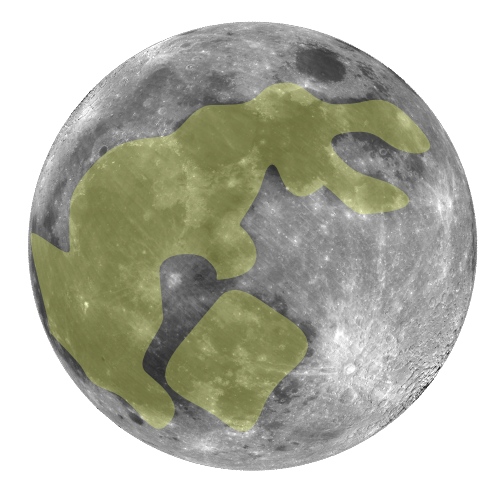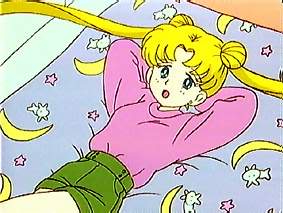From the surprisingly bloody children’s film, “Watership Down,” to my former cat’s affinity for killing baby bunnies and leaving them inside my Yellow Submarine playhouse, to being an absolutely delicious agnolotti filling, rabbits have led a tough life. Luckily, Japanese mythology cuts these cuddly, nervous creatures some slack by sending them far away from predators and overly enthusiastic Bunny Cafe guests. According to the Konjaku Monogatarishū (今昔物語集), a 12th century collection of folk tales from India, China, and Japan, our Man in the Moon was replaced by a rabbit.
The story is as follows:
“Every night the Old Man in the Moon looked down to Earth to see how his animals and people were doing. He smiled to see them resting after a hard day’s work. He hovered over rivers and lakes, lighting the waves and the shore. Then, he sailed on to other lands.
One night long ago, the Old Man lingered in the sky over a forest in Japan. The animals below seemed to him to live in peace and harmony. Suddenly he spotted a monkey, a fox, and a rabbit, living side by side. The Old Man began to wonder about these animals; he longed to know them better.
“Which of these animals is the kindest creature?” he asked himself as he watched the rabbit dash across the fields. “I wonder which is the most generous?” he said softly as he watched the monkey swing from a tree. “I wonder what they are truly like,” he said as he watched the fox paw at the forest floor to make his bed. “I need to know more about my creatures.”
The Old Man floated a while longer, but finally his curiosity got the best of him. “I must go and see for myself,” he said, and because the Old Man in the Moon is a magical creature, he was able to transform himself into a poor beggar. In this disguise he floated down to Earth.
He walked through the forest until he came to the clearing where the monkey, fox, and rabbit lived. When the creatures saw him, they looked up at him with bright shining eyes.
“Good day, sir,” the rabbit said. “How do you do?”
“Welcome to our forest,” said the monkey, and the fox bowed low.
“Oh, friends,” the Old Man said, leaning heavily on his walking stick, “I am not doing well. I am old and poor, and I am very hungry. Do you think you could help me?”
“Of course we’ll help,” the monkey chattered.
“We always help our friends,” the fox agreed.
“We’ll fetch some food for you,” the rabbit added, and without a moment’s hesitation, the three ran off, each one in search of food to offer the poor beggar.
The Old Man sat down and leaned against a tree. Looking up into his sky, he smiled. “These are good animals,” he said to himself, “and I am curious to see who is the most generous.”
Before long the monkey returned, carrying an armload of fruit. “Here you are,” the monkey said. “The bananas and berries are delicious. And take these oranges too, and these pears. I hope you will enjoy my gifts,” and he lay his fruit before the beggar.
“Thank you, my friend. You are kind,” the beggar said, and before he had finished speaking, the fox raced into the clearing. He carried a fat, fresh fish between his teeth, and this he laid before the beggar. Again he bowed.
“My friend,” the fox said, “I offer you a fresh fish to ease your hunger. I hope this will satisfy you.”
“You also are kind,” said the Old Man. “I never knew how kind the forest animals were.”
“Of course we are kind,” the monkey said proudly.
“And we are skilled at finding food,” the fox added.
Now all three sat waiting for the rabbit to return.
Meanwhile, the rabbit dashed this way and that through the forest, but no matter how he tried, he could not find food for the beggar. At long last he returned to the clearing.
“Friend,” the monkey cried, “you have returned!”
“I have,” the rabbit said sadly, “but I must ask you to do me a favor, dear friends. Please, Brother Monkey, will you gather firewood for me? And Brother Fox, with this firewood will you build a big fire?”
The monkey and the fox ran off at once to do as their friend asked, and the beggar sat quietly by, watching in wonder.
When the fire was blazing, the rabbit turned to the beggar. “I have nothing to offer you but myself,” he said. “I am going to jump into the fire, and when I am roasted, please feast upon me. I cannot bear to see you go hungry.” Rabbit bent his knees, preparing to jump into the fire.
The beggar at once threw away his stick and cast off his cloak. He stood straight and tall and proud, and the animals, seeing this strange transformation, began to shake with fear.
“Don’t be afraid,” the Old Man said. “You see, Rabbit, I am more than a beggar, and I have seen that you are more than generous. Your kindness is beyond price, but you must understand, I wish you no harm. I do not want you to sacrifice yourself for my comfort. I will take you home with me, where I can watch over you and make sure you are never harmed.”
The Old Man in the Moon lifted the rabbit into his arms and carried him up to the moon. The monkey and the fox watched in amazement, but they were grateful, for they wished their friend no harm.
If you look carefully at the moon when it is full and bright, you will see the rabbit living there in peace, helping to watch over us all.”
Friedman, Amy. Tell Me a Story: Timeless Folktales from Around the World. Vol. 2. Los Angeles: Friedman and Danziger, 2006.
Nice, right?
But after a while, lovingly watching over humanity gets boring. That’s why the Japanese moon rabbit (月の兎, Tsuki no Usagi) has a job. Inspired by a Chinese mythological tale in which a rabbit constantly pounds herbs to make an elixir of immortality for the gods, the Japanese rabbit pounds mochi, a sticky rice mixture, to make cakes. The rabbit and the mochi pounding block are outlined below:

Now you will never un-see it!
The connection between rabbits, the moon, and mochi is reflected in traditional confectionery shops throughout Japan, where rabbit motif cakes are a popular option for autumn moon-viewing parties and tea ceremonies:

The moon rabbit has even nestled into modern pop culture. Sailor Moon’s human alias’ name is Tsukino Usagi, a pun on 月のうさぎ (Tsuki no usagi), which means Moon Rabbit! Her daughter’s name, Chibi-usa, means little rabbit. I love a good visual pun, so check out these bed sheets:

If heavy snow clouds aren’t in your way, say おやすみ (oyasumi, Good Night), to the dutiful rabbit in the moon!

Leave a comment